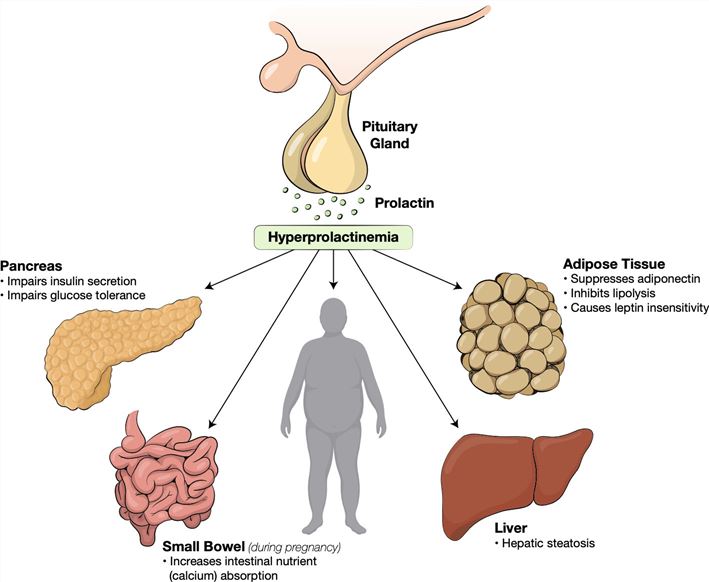IVD antibodies have been commonly used in immunodiagnostic kits for disease diagnosis and prognosis. Creative Biolabs has built a versatile IVD platform to provide custom biomarker-specific IVD antibody development services to global clients.
Prolactin (PRL), a 197-199 amino acid polypeptide hormone, belongs to the family of the structurally similar somatomammotropin hormones, which includes PRL, GH, and human placental lactogen (hPL). The gene that encodes for its biosynthesis in the adenohypophysis is located on chromosome six and gets regulated by a transcription factor called Pit-1. PRL contributes to enlarge the mammary glands and prepare for milk production during pregnancy stage.
Features of Prolactin
PRL is a single chain polypeptide of 23 kDa. It has three intramolecular disulfide bridges between residues 4-11, 58-174, and 191-199, N-linked (in some species, O-linked) glycosylation sites, and three phosphorylation sites. PRL has many variants since the PRL gene has several potential splice sites. The full spectrum of PRL functions in humans is not completely understood. What we know for now is that it affects many physiological processes which include the regulation of mammary gland development, initiation and maintenance of lactation, immune modulation, osmoregulation, and behavioral modification. Besides, PRL also exerts mitogenic, morphogenic, or secretory activities at the cellular level. It's the features that structural polymorphism, local production and processing, and divergent intracellular signaling pathways and target genes lead to the diversity of PRL actions. PRL can act not only in an endocrine manner but also in an autocrine and a paracrine manner on many distinct cell types throughout the body. However, the presence of PRL at any given site should not be thought to be evidence for local synthesis. PRL can be transferred from the circulation into another compartment by PRL-binding proteins or be delivered to other sites by infiltrating lymphocytes or migratory macrophages.
 Fig.1 The influence of prolactin levels on metabolic processes in hyperprolactinemia.1
Fig.1 The influence of prolactin levels on metabolic processes in hyperprolactinemia.1
Prolactin as a Biomarker for Metabolic Diseases
It is not surprising that abnormalities in the secretion or action of extrapituitary PRL might be associated with different kinds of disease states, as the consequence of the fact that produced PRL has distinct effects in a wide variety of tissue. Numerous disorders appear to be associated with abnormal PRL physiology. Amenorrhea, galactorrhea, and impotence are the best documented dysfunctions resulting from hyperprolactinemia. PRL is considered to relate to autoimmunity as hyperprolactinemia has been observed in some autoimmune diseases such as systemic lupus erythematosus (SLE), RA, systemic sclerosis, type 1 diabetes mellitus (DM), Graves' diseases (GD), Addison's disease (AD), etc. Experimental studies indicated that PRL has effects on food intake, body weight gain, and insulin resistance via inhibiting adiponectin and IL-6 production in adipose tissue which may lead to type 2 diabetes mellitus. Several studies have also shown that PRL has effects on growth of pancreatic ß-cells and reduces threshold for glucose-stimulated insulin secretion indicating the protective role of PRL against type 2 diabetes mellitus.
Creative Biolabs helps develop novel anti-prolactin antibodies for your IVD projects. Having completed a number of IVD antibody generation and development projects, Creative Biolabs is confident to offer you the best products and services to promote your project a success.
If you are interested in the services we can provide, please don't hesitate to contact us or directly send us an inquiry.
Reference
- Kirsch, Polly, et al. "Metabolic effects of prolactin and the role of dopamine agonists: A review." Frontiers in endocrinology 13 (2022): 1002320. Distributed under Open Access license CC BY 4.0, without modification.
For Research Use Only.